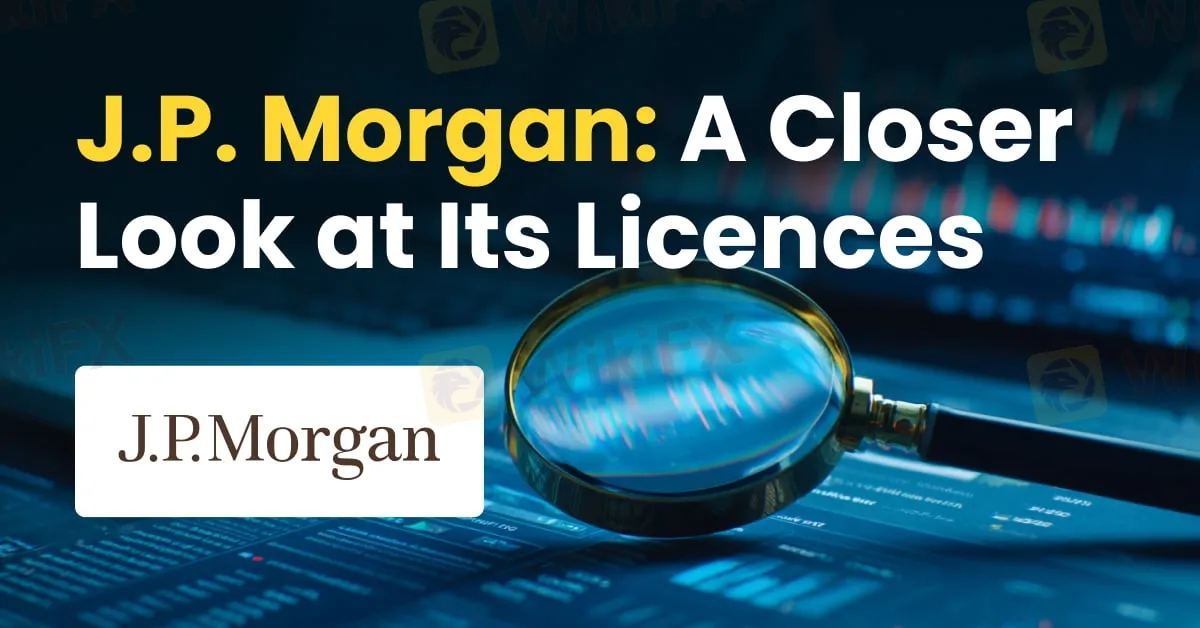简体中文
繁體中文
English
Pусский
日本語
ภาษาไทย
Tiếng Việt
Bahasa Indonesia
Español
हिन्दी
Filippiiniläinen
Français
Deutsch
Português
Türkçe
한국어
العربية
J.P. Morgan: A Closer Look at Its Licences
Abstract:J.P. Morgan is one of the most recognised names in global finance, operating in more than 100 countries and providing a wide range of services to governments, large corporations, institutions, and individuals. It has built a reputation over many years, supported by its international presence and broad regulatory coverage.

J.P. Morgan is one of the most recognised names in global finance, operating in more than 100 countries and providing a wide range of services to governments, large corporations, institutions, and individuals. It has built a reputation over many years, supported by its international presence and broad regulatory coverage.
According to WikiFX, a global broker verification platform, J.P. Morgan holds a WikiScore of 7.78 out of 10. This score is based on several factors, including regulatory status, risk management, software, business operations, and trading environment.

J.P. Morgan operates under multiple licences in the Asia-Pacific region. In Hong Kong, the company is regulated by the Securities and Futures Commission (SFC). Two entities hold licences to deal in futures contracts:
- J.P. Morgan Broking (Hong Kong) Limited, under licence number AAB027
- JPMorgan Asset Management (Asia Pacific) Limited, under licence number AAA121


Both of these licences are currently active and show that the company is authorised to carry out specific financial activities under Hong Kong law.
In Malaysia, J.P. Morgan is regulated by the Labuan Financial Services Authority. The licensed entity, JPMorgan Chase Bank, National Association, is listed as a Market Maker. Although the licence number has not been publicly released, the regulatory status is marked as active.

In summary, J.P. Morgan continues to operate under regulated licences in multiple financial centres, particularly in Hong Kong and Malaysia. Its long-standing regional presence, strong reputation, and high WikiScore suggest a firm that is both established and actively engaged in delivering financial services and community support. However, as with any institution, potential clients should stay informed about the scope and location of its regulated entities before engaging in any financial activity.

Disclaimer:
The views in this article only represent the author's personal views, and do not constitute investment advice on this platform. This platform does not guarantee the accuracy, completeness and timeliness of the information in the article, and will not be liable for any loss caused by the use of or reliance on the information in the article.
Read more

Yen Rebounds! Is This the Opportunity Investors Have Been Waiting For?
The Japanese yen has staged a sharp rebound, breaking below key technical levels against the U.S. dollar. With diverging central bank policies, heightened risk sentiment, and a shifting macro backdrop, is this a real opportunity—or a trap?

VIPS Group of Companies Exposed: ED Seizes Assets in 100-Crore Ponzi Forex Scam
The Enforcement Directorate (ED) has cracked down on an INR 100-crore scam involving illegal forex trading and Ponzi schemes by seizing immovable assets and digital devices besides freezing bank accounts across multiple cities in India. Read more.

Foraxi Joins the WikiFX Family
Explore how the addition of Foraxi to the WikiFX family opens up forex trading growth avenues for traders around the world.

Iran’s Strait Strategy: Is the World Ready for $100 Oil?
Tensions in the Middle East are rising quickly, and global oil markets are already feeling the pressure. Since Iran and Israel entered open conflict, oil prices have jumped from around $60 to nearly $80 per barrel. Now, with the United States joining the fight and launching strikes against Iran, the situation has become even more serious. Iran’s threat to seal off the Strait of Hormuz could ignite a global energy meltdown, spike oil prices beyond $100, and unleash economic chaos across the world.
WikiFX Broker
Latest News
Dow futures slide 150 points as oil rises following U.S. bombing of Iran: Live updates
Asia-Pacific markets set to open lower as U.S. bombing of Iran escalates Middle East crisis
Oil at $100 a barrel? U.S. role in Iran-Israel fight fuels market jitters
Consob Blocks 7 Fraudulent Investment Websites Amid Ongoing Crackdown
MyFundedFutures Tightens Compliance Measures Following Regulatory Pressure
European markets start the week lower as Middle East crisis worsens
Top Wall Street analysts like these three stocks for long-term growth
Investors Beware! The Pound May Face a Downturn in the Second Half of the Year
Latest FCA Warning List Out! Beware & Protect Your Money
Stock futures rise after Trump says Iran-Israel ceasefire is in effect: Live updates
Currency Calculator


